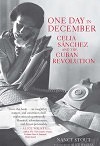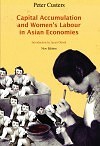Feminism
Ariel Salleh, ed., Eco-Sufficiency and Global Justice: Women Write Political Ecology (New York: Pluto Press, 2009), 324 pages, $34.00, paperback.
In 2001, Wilma Dunaway wrote that the “tentacles of the world-system are entwined around the bodies of women.” Yet her literary analysis revealed a profound silence about the role of women in reproductive labor, subsistence households, and commodity chain analysis. Dunaway characterized this omission as, “the greatest intellectual and political blunder” in her field.…Nearly ten years later, Ariel Salleh has answered this unspoken call with the resounding voices of seventeen feminist scholars who address transdisciplinary issues of global political ecology. | more…
Margaret Randall, To Change the World: My Years in Cuba (Piscataway, NJ: Rutgers University Press, 2009), 256 pages, $24.95, paperback.
Margaret Randall has always been too much of a feminist for the socialists and too much of a socialist for the feminists. She is one of the foremost oral historians of recent revolutionary history and, more specifically, of the history of women in revolutions. Yet her work has been consistently undervalued. Her memoir…is a rare double opportunity: an intimate look at the Cuban Revolution from 1969 to 1980, and a fascinating portrait of the development of a historian, poet, and political thinker. | more…

Celia Sánchez is the missing actor of the Cuban Revolution. Although not as well known in the English-speaking world as Fidel Castro and Che Guevara, Sánchez played a pivotal role in launching the revolution and administering the revolutionary state. The product of ten years of original research, One Day in December draws on interviews with Sánchez’s friends, family, and comrades in the rebel army, along with countless letters and documents. This is the extraordinary story of an extraordinary woman who exemplified the very best values of the Cuban Revolution: selfless dedication to the people, courage in the face of grave danger, and the desire to transform society. | more…
Who could have imagined the 2008 presidential campaign?
Commentators, media people, and especially politicians fell all over themselves proclaiming that the 2008 election had, “nothing at all to do with race.” And yet every event, every speech and comment, every debate and appearance had race written all over it. Stephen Colbert, the brilliant satirist, hit it on the head when he asked a Republican operative, “How many euphemisms have you come up with so far so that you won’t have to use the word ‘Black?’” Everyone laughed good-naturedly. | more…

The global impact of Asian production of the wage goods consumed in North America and Europe is only now being recognized, and is far from being understood. Asian women, most only recently urbanized and in the waged work force, are at the center of a process of intensive labor for minimal wages that has upended the entire global economy. First published in 1997, this prescient study is the best available summary of this crucial process as it took hold at the very end of the twentieth century. This new edition brings the discussion up to 2011 with an extensive introduction by world-famous economist Jayati Ghosh of Delhi’s Jawaharlal Nehru University. | more…
Forty years ago this summer, a group of women and men came together to form the National Organization for Women (NOW). NOW’s mission was to fight for gender equality through education and litigation. While not the only group fighting for women’s rights, it quickly became one of the best known and largest. Today, NOW has over a half million members and over 500 chapters throughout the country. NOW was founded at a time when women were entering the paid labor force in increasing numbers. NOW had its critics: many said it ignored race and class, others said it was too focused on liberal feminist legal strategies like passing the Equal Rights Amendment. Numerous other organizations representing working-class women and women of color developed, including the Coalition of Labor Union Women, 9to5, the National Organization of Working Women, and the Combahee River Collective. Together with a myriad of other groups these organizations helped build the women’s movement of the 1960s and 1970s | more…
At some level, perhaps not too well articulated, socialist feminism has been around for a long time. You are a woman in a capitalist society. You get pissed off: about the job, the bills, your husband (or ex), about the kids’ school, the housework, being pretty, not being pretty, being looked at, not being look at (and either way, not listened to), etc. If you think about all these things and how they fit together and what has to be changed, and then you look around for some words to hold all these thoughts together in abbreviated form, you’d almost have to come up with “socialist feminism.” | more…
I have a confession to make: I do not work. I am on SSI.1 I have very little work value (if any), and I am a drain on our country’s welfare system. I have another confession to make: I do not think this is wrong, and to be honest, I am very happy not working. Instead I spend the majority of my time doing the activity I find the most rewarding and valuable, painting | more…
The movement against the war in Iraq was the largest antiwar movement that has ever taken place. Even in the United States, where opposition to the war was not as large as in many other parts of the world, demonstrations against the war grew with astonishing rapidity. Before the war began demonstrations had reached sizes that, during the war in Vietnam, took years of organizing to mobilize. The antiwar movement, in the United States as elsewhere, was also in many respects quite broad. It included not only people on the left, antiglobalization activists and peace organizations, but also churches, other religious organizations, trade unions, and many other organizations not associated with the left. And it included very large numbers of people who came to demonstrations as individuals, rather than as members of organizations, and who had never before participated in a political protest | more…
Some would say socialist feminism is an artifact of the 1970s. It flowered with the women’s liberation movement, as a theoretical response to what many in the movement saw as the inadequacies of Marxism, liberalism, and radical feminism, but since then it has been defunct, both theoretically and politically. I think this view is mistaken | more…
There is no longer an organized feminist movement in the United States that influences the lives and actions of millions of women and engages their political support. There are many organizations, ranging from the National Organization for Women to women’s caucuses in labor unions and professional groups, which fight for women’s rights, and there are many more organizations, many of them including men as well as women, whose priorities include women’s issues. But the mass women’s movement of the late sixties, seventies, and early eighties no longer exists. Few, among the many women who regard themselves as feminists, have anything to do with feminist organizations other than reading about them in the newspapers. Young women who are drawn to political activism do not, for the most part, join women’s groups. They are much more likely to join anticorporate, antiglobalization, or social justice groups. These young women are likely to regard themselves as feminists, and in the groups that they join a feminist perspective is likely to affect the way in which issues are defined and addressed. But this is not the same thing as a mass movement of women for gender equality. A similar dynamic has taken place in other circles as well. There are now very large numbers of women who identify with feminism, or, if they are reluctant to adopt that label, nevertheless expect to be treated as the equals of men. And there are large numbers of men who support this view | more…
The story of how Helen Keller (1880-1967), struck blind and deaf while a toddler, overcame her disabilities with the help of her teacher Anne Sullivan, is a familiar one. William Gibson’s drama, The Miracle Worker, made into a movie, popularized that part of her story. She is remembered for accomplishments such as graduating cum laude from Radcliffe College; as an internationally famous advocate for the deaf and blind; and as a celebrity, writing books, appearing in films and on the vaudeville stage. Her friend Mark Twain described her, along with Napoleon, as one of the “two most interesting characters of the nineteenth century.” What is usually forgotten, however, is that she was also a prominent, articulate, and passionate voice for socialism. From a condition of profound isolation she grew into an inspired communicator, fully engaged with the world around her. She joined the Socialist Party in 1909 (later she’d join the Industrial Workers of the World, too) and championed her socialist vision while lecturing and writing on the issues of her day-in support of worker’s struggles, the Russian Revolution, and women’s suffrage, and against the First World War. There was no separation in her mind between her struggle on behalf of the disabled and her struggle for socialism. She attributed the greater portion of the ills experienced by the disabled, and the cause of these disabilities in many cases, to capitalism and industrialism. After 1921, she focused her energies on raising funds for the American Foundation for the Blind but she remained a supporter of radical causes for the rest of her life. This essay appeared in the New York Call, a daily newspaper of the Socialist Party, on November 3, 1912.
—The Editors

